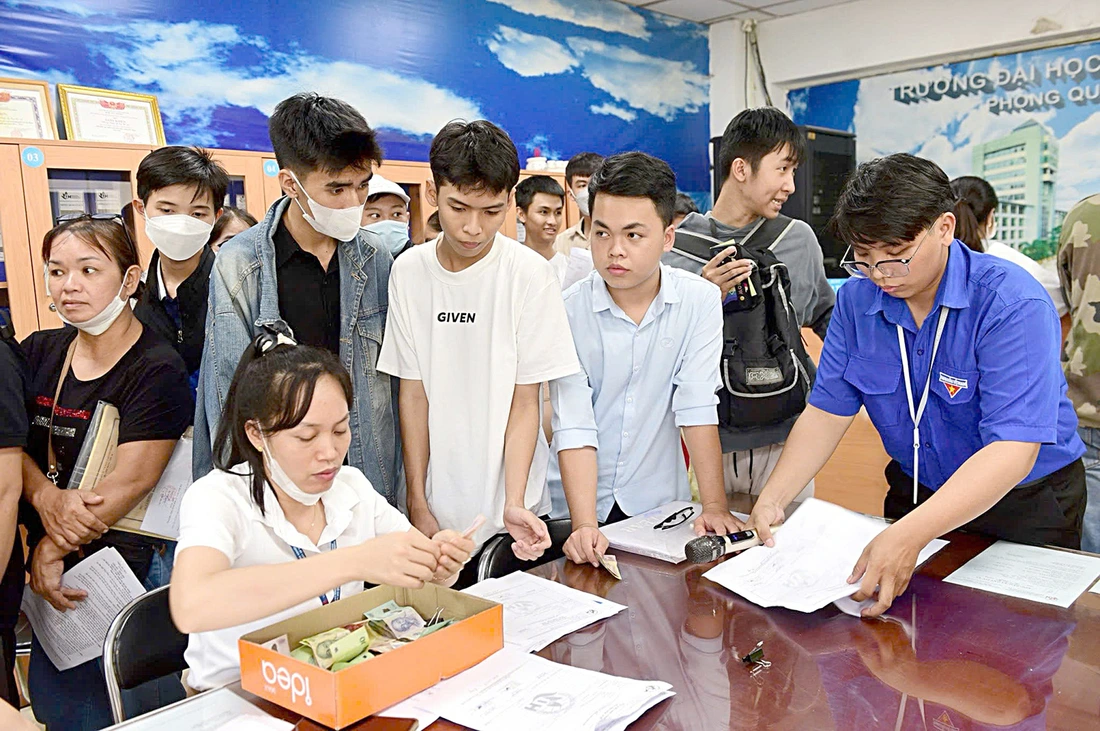
Students pay tuition and complete admission procedures at Ho Chi Minh City University of Industry - Photo: DUYEN PHAN
In the draft revised Law on Personal Income Tax, the Ministry of Finance proposes that taxpayers are allowed to deduct from their income before calculating tax the expenses for healthcare, education and training of the taxpayer and his/her dependent parents, spouse and children.
The above expenses must meet the requirements on invoices and documents as prescribed by law and cannot be paid from other sources.
According to the Ministry of Finance, this is completely new content compared to previous regulations. Currently, the Ministry of Finance is seeking comments from ministries, localities, associations, etc. on the draft law, including the above content.
Talking to Tuoi Tre , although highly appreciating this proposal of the Ministry of Finance, experts and National Assembly delegates also suggested that the regulations need to be more specific. Consider expanding to some other expenses such as housing... At the same time, the deduction procedure must be clear and easy to implement. Some people even raised the question: why is the family deduction also calculated for tuition fees (which are exempted from kindergarten to grade 12), hospital fees (which will be exempted in the future)...?
* Ms. VU THU HA (Deputy General Director of Tax & Legal Consulting Services, Deloitte Vietnam):
College tuition should be deducted.

I think this is a very practical supportive tax policy of the Government , contributing to significantly reducing the financial burden on taxpayers, especially middle-income households and many dependents. Besides, the policy is also consistent with international practices and many countries in the region.
Encouraging investment in education and supporting medical expenses will contribute significantly to improving the quality of human resources while ensuring social security.
As for tuition fees, from next year, the State will exempt public school tuition fees for kindergarten through grade 12, but in reality, each student still has to pay many other expenses such as books, school supplies, meals, as well as extra classes to improve foreign languages, physical fitness and skills. These expenses should be considered for deduction from personal income tax at a reasonable level to reduce the burden on families with school-age children.
Or like university tuition, most students are still considered dependents. Therefore, this expense should also be considered for deduction, demonstrating a tax policy that goes hand in hand with investment in education and the development of high-quality human resources.
In order for the tax deduction policy to truly come into effect, in my opinion, the procedures need to be simple, transparent and not create additional administrative burdens. The Ministry of Finance should issue flexible guidelines on the storage and verification of electronic invoices and enhance data connections with hospitals, schools, training centers, etc. Thereby, people do not need to directly provide many documents but still ensure authenticity.
* Dr. NGUYEN QUOC VIET (public policy expert, University of Economics - Vietnam National University, Hanoi):
Business individuals also need to be deducted.

I completely agree with the above proposal. As each family and individual has different needs for investing in personal development, it should be allowed to be deducted before calculating taxes.
For example, people buying insurance products or even the cost of education and training also need to be deducted. In the context of labor transfer, business sectors, market changes... people have to constantly improve their qualifications and update their knowledge.
Regular training requires expenses. Therefore, not only individuals with income from wages and salaries can deduct these expenses, but also business people need to deduct these investment expenses before calculating income tax. This ensures fairness and the true nature of personal income tax.
* Dr. NGUYEN NGOC TU (tax expert):
Rent or mortgage deduction
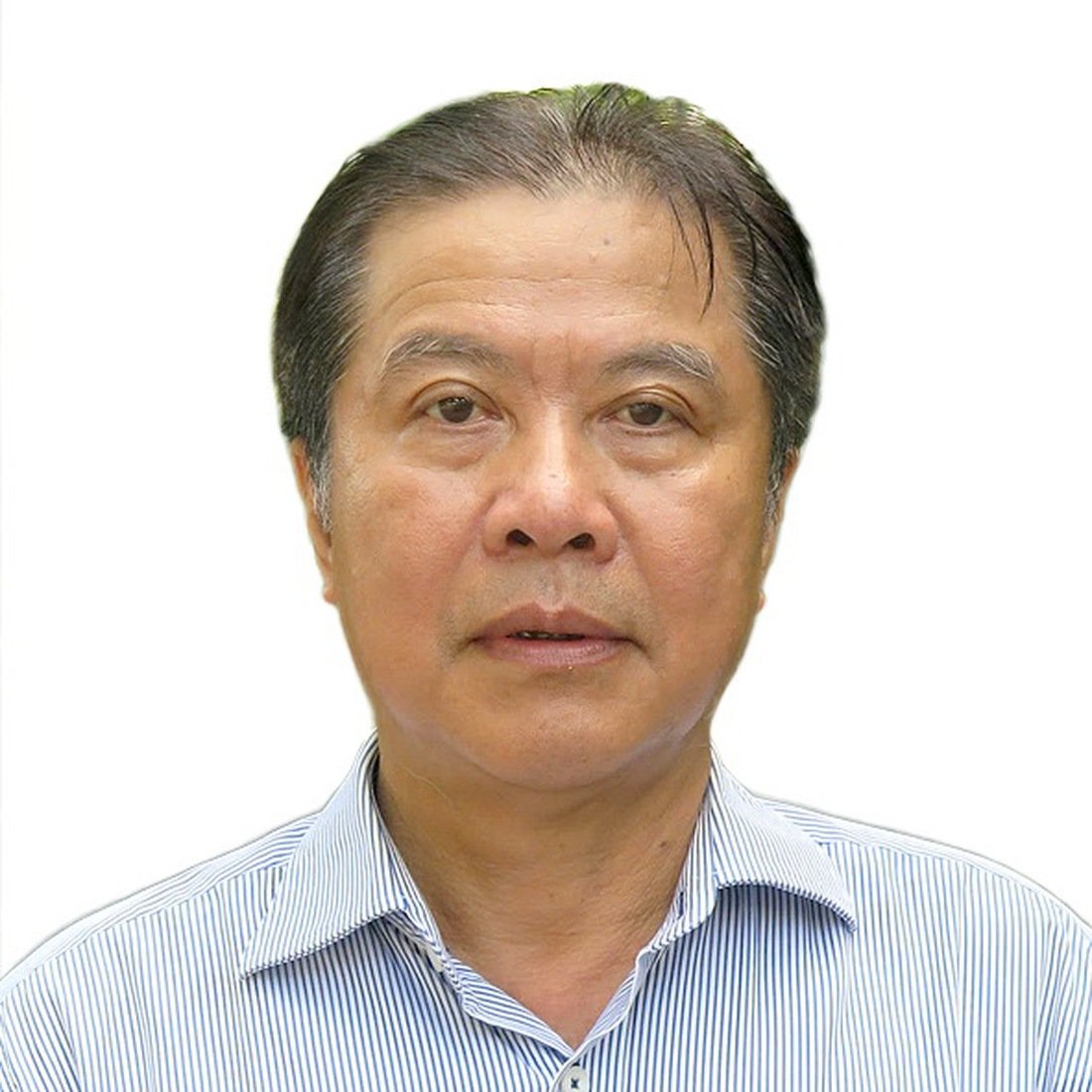
I think the policy should include additional housing expenses such as rent and mortgage interest payments. These are social security expenses, ensuring essential needs for the people. And to be deducted, according to regulations, taxpayers must have invoices and supporting documents.
As for tuition fees, whether they are public or private schools, or even studying abroad, they are also deductible. In addition to tuition fees, expenses for foreign language classes, musical instruments, swimming lessons, etc. to improve knowledge and soft skills should also be deductible, as long as there are invoices and documents.
Investing in people is investing in the future, in development. Investment costs in education, training and health care will contribute to the country's high-quality human resources. Therefore, we need to have policies to encourage and support.
However, in the context that the state budget still has to spend on development investment and social security, taxpayers need to share with the state in the direction of stipulating a certain percentage to be deducted from these expenses before calculating taxes. The level could be 30 - 50%. Later, when the national budget and finance are strong, this ratio can be raised to 70 - 90%, even the whole like developed countries.
* Delegate TRAN KHANH THU (Hung Yen):
Policies need to ensure appropriateness and effectiveness.

The content of the draft Law on Personal Income Tax as above is a remarkable step forward. However, with the costs of medical examination and treatment, there should be a reasonable scope of application.
I agree with the proposal to allow deductions for taxpayers and legal dependents on medical expenses. But we also need to see that currently, with the high coverage rate of health insurance and according to regulations, many of the contents of people when examining and treating diseases are included in the payment list of the health insurance fund, but in reality, people still have to pay for these lists when they request services.
Therefore, there should be more specific regulations for expenses from the payment list covered by health insurance or commercial insurance. In addition, for drugs and medical equipment that people have to buy outside when treating illnesses prescribed by doctors, recommended by doctors and with invoices, it should also be studied whether they can be considered for deductions. If yes or no, there should be specific and clear regulations for easy implementation later.
I think that the maximum deduction should be regulated at a certain ratio compared to taxable income, to ensure fairness among taxpayers, avoiding the situation where high-income earners benefit more. The deduction can be considered based on actual expenses but not exceeding a certain ratio compared to taxable income.
In fact, for a working-class family in the city, having to pay tuition fees for two children every month, plus medical treatment costs not covered by insurance, the total amount can be up to tens of millions of VND per year. If deducted before calculating taxes, the policy will help reduce the burden significantly and accurately reflect the actual payment ability of the people.
* Delegate TA VAN HA (Vice Chairman of the Committee on Culture and Education):
Research on regulating ceiling threshold for education costs

It is commendable that the Ministry of Finance listened to opinions and consulted international experience when proposing to include other specific expenses related to education and health care for taxpayers and their dependents. The drafting agency proposed in the bill that the Government would provide detailed regulations to ensure flexibility and suitability to the socio-economic situation.
For example, a person in the city earns 20-25 million VND/month but has to spend 8-10 million VND on their children's tuition fees, the remaining amount for actual spending is only equivalent to someone earning 12-15 million VND. If such expenses are not deducted, the tax system will inadvertently "tax" the entire cost of living, which is both unreasonable and inhumane. However, regarding education, I think the Government needs to clearly stipulate that educational expenses only apply to taxpayers and to dependents who are children. As for dependents who are parents and other dependents, only health care expenses should be regulated, and educational expenses should not be deducted because it is not appropriate.
In addition, from the 2025-2026 school year, we will exempt tuition fees for students up to high school level, so we need to study this policy appropriately. In addition, for public high schools, tuition fees have been exempted and in fact, tuition fees are not too high, but for private and non-public schools, especially international schools, tuition fees for students are currently many times higher. Therefore, it is necessary to study how to calculate education costs for this group appropriately.
I think the Government can study and propose a specific ceiling for tax-deductible education expenses, to ensure that these expenses do not exceed a certain percentage of the taxpayer's income.
In addition, it is also possible to base on the maximum cost of tuition fees of public schools from elementary to university to calculate a reasonable deduction level.
Taxpayers themselves also need to have ongoing training costs to update their knowledge and improve their qualifications, such as learning foreign languages, learning about new technologies such as AI, or short-term courses directly related to their jobs. Therefore, the Government can consider regulating a maximum deduction level in each year that taxpayers can deduct.
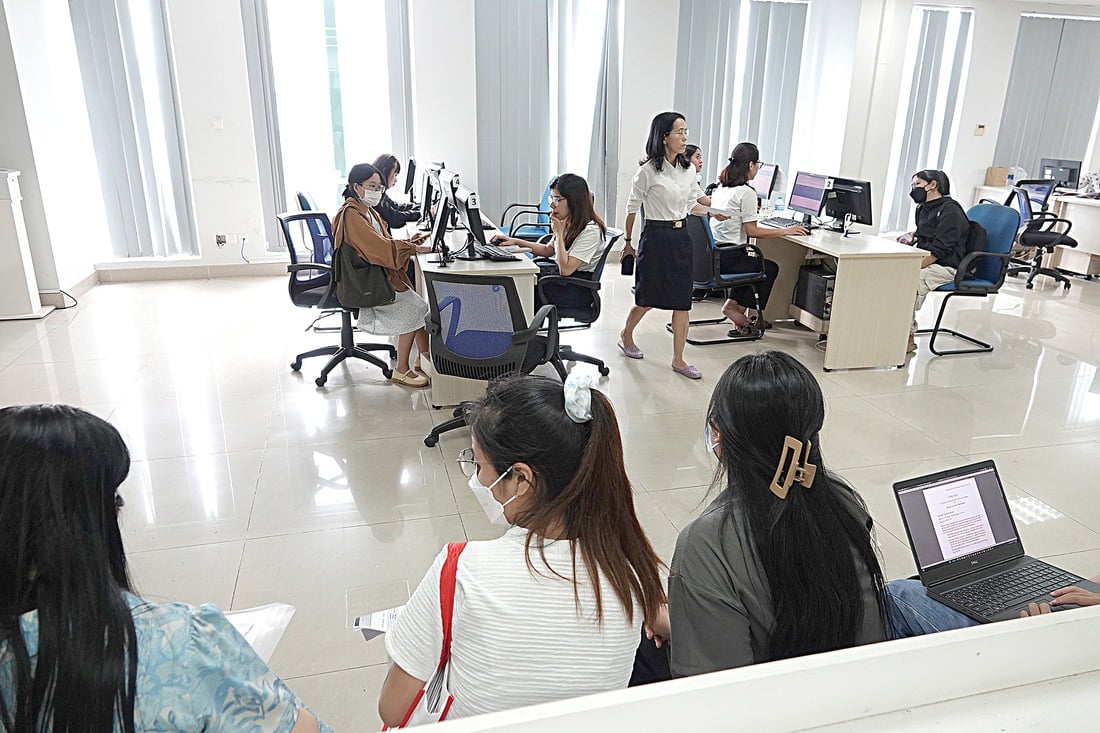
People come to work at the Ho Chi Minh City tax office on July 2 - Photo: TTD
Personal income tax in the EU: Get your tax refund right
When you become a tax resident in the European Union after 6 months of settlement, you not only pay global income tax but also enjoy flexible tax deductions.
Not all income is taxable at the prescribed rate, smart deductions can help you get a significant amount back from your budget.
Each EU country has its own regulations, except Monaco which does not impose personal income tax (PIT).
Germany: "Too Strange" Deductions for Vietnam
In Germany, the 2025 personal income tax (Einkommensteuer) is bracketed from 0% (under 13,307 euros) to 45% (over 280,000 euros), according to the German Federal Tax Administration. Data from Vermögenszentrum.de shows that these tax rates are regulated as follows: income levels of 13,308 - 65,000 euros are subject to tax from 14 - 42%; from 65,000 - 240,000 euros are subject to tax at 42%; from 240,000 - 280,000 euros increases to 45%; and income above 280,000 euros is subject to tax at 45%.
However, there are many ways to declare taxes, requiring expertise. For example, Ms. Hanh's family in Cologne has always hired a professional tax declaration company for nearly 20 years. "Declaring taxes has many detailed items, I feel I don't have enough expertise to get the largest tax refund," Ms. Hanh shared.
And every March, people need to prepare bills for work expenses (software, equipment, travel, Internet), health expenses, childcare, and even certified charity… to declare deductions.
Mr. Phu, working at Commerzbank Frankfurt, shared that he found that the tax refund level in Germany is very flexible depending on the profession. For example, programmers are deductible for computers and home workspace, while sales staff only deduct phones and transportation. Germany encourages families through preferential tax coefficients - high-income earners choose coefficient 3, low-income earners choose coefficient 5. Therefore, the ability to explain in a legal and reasonable manner for each individual is a factor that determines the tax refund level.
France, Italy: preferential treatment for large families
Personal income tax in France is calculated by household, the more members the more benefits. Anh Minh, a bridge engineer in Lyon (France), explains: "A family with coefficient 1 is exempted from tax of 10,000 euros, two people are exempted from tax of 20,000 euros, an additional child with coefficient 0.5 is exempted from an additional 5,000 euros, single mothers with coefficient 2 are subject to very low tax."
According to Koronapay.com, the personal income tax rate in France is regulated from 0% (under 10,084 euros) to 45% (over 158,122 euros). In addition to work deductions similar to Germany, France also deducts child education support, housing purchases, home security costs and charity.
In Italy alone, personal income tax ranges from 23% (under 15,000 euros) to 43% (over 50,000 euros). Instead of filing a tax return at the end of the year, Italy uses the Modello 730 or Modello Redditi tax refund form. Lorelei, a researcher in Turin (Italy) who has worked in both France and Germany, commented: "The tax rates for single people in France and Italy are higher than in Germany. However, in France and Italy, the family deduction is more attractive, even including veterinary expenses because pets are considered dependents."
For those who are settling in the EU, if they know how to declare properly and intelligently, they will have the opportunity to get a significant tax refund. From work expenses to family support, each country has its own "secret".
Tax deduction for money sent to relatives abroad
Gabriele Röhrig, a tax consultant in Bavaria, Germany, says that money transferred to dependent relatives abroad (including children, parents, grandparents, grandchildren and other relatives) can be deducted from tax. However, not all EU countries allow this. If it is allowed, you need to do two things: First, provide evidence that the recipient is truly dependent (a bank statement opened in their name) and documents proving the family relationship. Second, keep a receipt for the transfer that is accepted by European tax authorities.
Source: https://tuoitre.vn/giam-tru-chi-phi-nop-thue-thu-nhap-ca-nhan-vi-sao-khong-giam-tru-chi-phi-nha-o-20250803083211487.htm



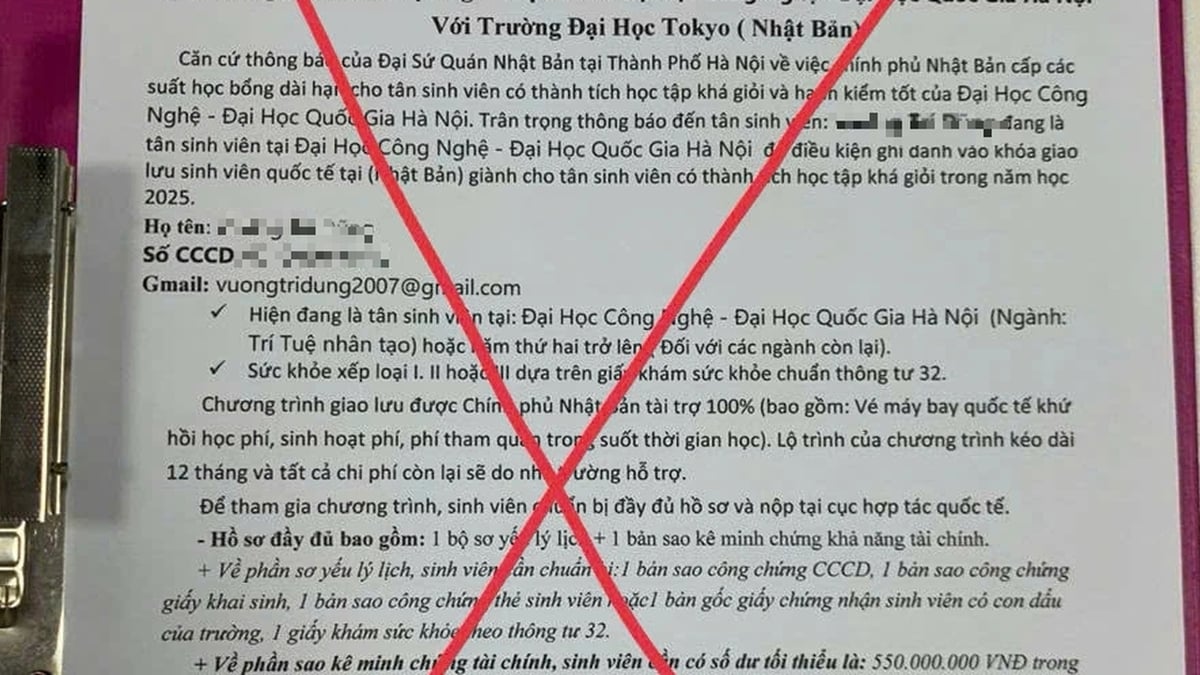
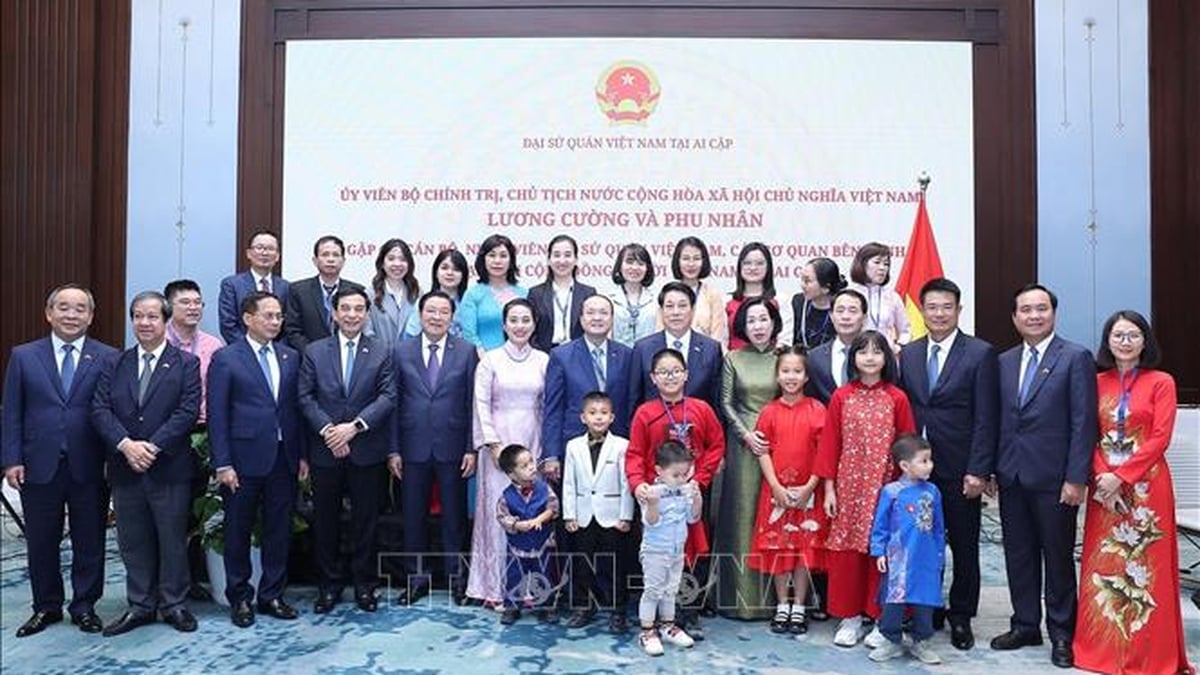




























































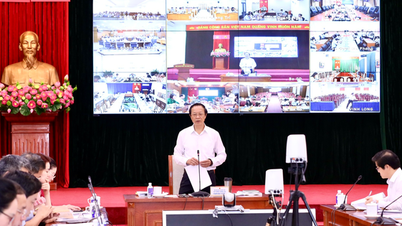
































Comment (0)